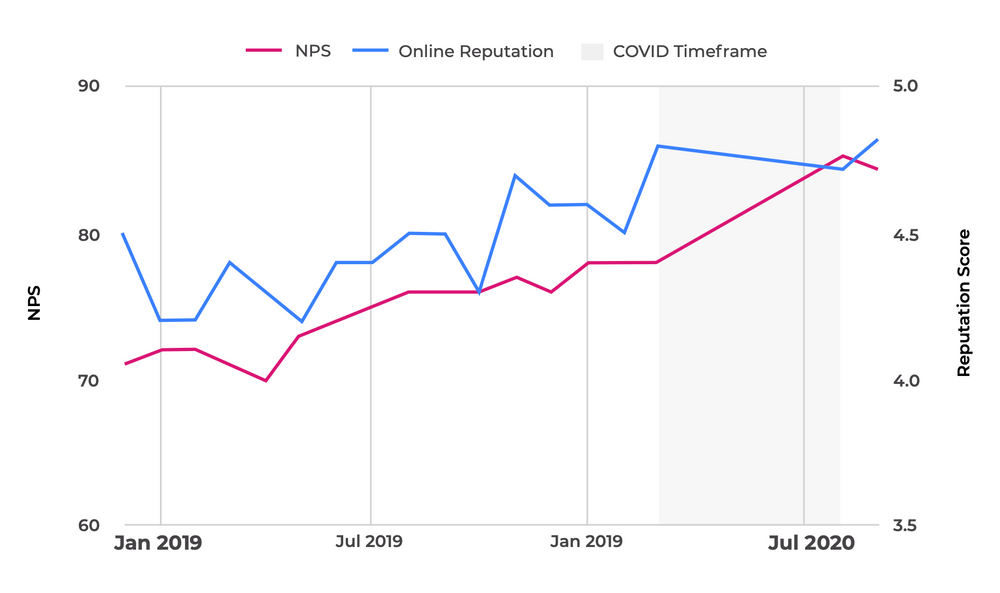Hospitality’s Step-by-Step Guide to Reputation Management
For effective reputation management your restaurant needs Yumpingo.
A hospitality leader’s top priorities are often: ensuring service consistency, driving repeat customers and identifying ways to reduce overhead costs.
In order to achieve any of those outcomes, they have to understand what guests are looking for when searching for a unique culinary experience. A guest’s perception of your brand, food, and atmosphere can make the difference between reaching capacity bookings each week or experiencing an uncomfortably quiet Friday night.
The impact of 2020 has consumers paying more attention to quality and service than ever before as they switch their mindset from ‘spending’ a dollar to ‘investing’ a hard-earned dollar into time and value.
With the rise of to-go and delivery, managing your reputation and meeting guest expectations is more critical than ever.
We’re sharing a step-by-step guide to effective reputation management that breaks down how you can get complete control of your brand.
What is reputation management?
For any segment, whether it be bars and pubs, fine dining, or fast-casual, managing your brand reputation online can seem daunting. Common digital channels of Instagram, Twitter, Facebook, TripAdvisor, Google and Opentable get exponentially more difficult to maintain as you grow.
However, understanding the way your brand is portrayed on each platform can help you develop strategies to optimise and maintain a positive guest perception.
Simply put, reputation management is the act of monitoring and improving the way people view your brand.
According to one survey, 97% of businesses in the hospitality sector said that online reputation management is important to their hotel bar or restaurant. As online reviews have exploded, maintaining a positive online presence and engaging with your customers has assumed huge importance.
How to manage reviews properly
Your restaurant is getting reviewed online in a variety of ways and at an unpredictable volume. The way you monitor feedback can help you manage customer expectations and derive insights that help you improve every aspect of your business.
With a centralised reputation management platform, you can view incoming feedback from any channel, in a single inbox. Having an aggregated review feed can help you mitigate any issues as they are shared, and keep you connected to constructive or positive customer feedback.
A one-star negative review has landed on one of your online profiles. While positive reviews can help you refine your customer communication and marketing strategies, the way you respond to negative reviews can define your business.
Before you respond, take a minute. You need to depersonalise the situation and shift into a calm mindset that lets you reply objectively. The best way to minimise the impact is to reply publicly and thank your guest for taking the time to comment.
This is your opportunity to turn a poor customer experience into a better one so you need to show concern, take action and deliver a positive outcome:
- Use your response to give context and reply directly to your guest’s concerns. By showing you sympathise and take responsibility for what went wrong you’ll appear positive and professional.
- Show proof that the problem was an outlier and that you’ve taken concrete steps to fix it. Make sure you take the opportunity to address any issues with your staff to find a workable solution then demonstrates to your guests just how it’s being implemented.
- Take the opportunity to market to future customers and offer a discount or other incentive. With just a few well-chosen words you can demonstrate that your restaurant cares about customer feedback and is serious about turning a negative into a positive.
By increasing your Yelp score by one star, you can gain 5-9% revenue.
According to TripAdvisor, 83% of guests will have an improved impression of your business if you respond to a negative review in a thoughtful way. For 8 out of 10 guests, those responses make your guests feel more cared about and a majority will then be prepared to make a booking.
Why is managing reviews important?
The link between reviews and revenue is vital to the success of any business, but failure to deal with negative reviews in a timely manner can have a huge impact on your restaurant business. A reputation that has taken you years to establish can be destroyed in just minutes if you fail to pick up on critical feedback and address it in the right way, at the right time and through the right channels.
Keep in mind that your restaurant needs to be part of the review ecosystem. After all, potential customers can’t just try before they buy so they compare online reviews instead. With 97% of business owners sharing the importance of online reputation management, can you afford to ignore those negative reviews?
A centralised reputation management platform gives you oversight of all your ratings and reviews at-a-glance. You can quickly pick up on the positives and negatives, responding in a timely fashion and identifying areas for service or operational improvement in your restaurant.
Next Steps to Managing Reviews at Restaurant Speed
If you want to gain the power to drive loyalty and increase guest visits, you need complete visibility into how your brand is performing with every digital footprint it touches.
If you want to get more guests coming back then you need an efficient and effective way to understand your business and to track and optimise your online reputation and the guest experience.
Key next steps:
- Manage and respond to ratings, reviews and messaging in a consolidated view to reduce the administrative work it takes to track manually.
- Engage customers across all social and digital channels with a single brand voice to ensure the experience with your restaurant remains consistent any time, any place…
- Respond quickly through a ticketing system with automated workflows.
- Measure customer satisfaction across all your venues and locations with performance metrics.
Manage the full customer journey
Grow your brand awareness, improve the experience and increase advocacy to build a virtuous cycle of guest satisfaction and sales growth.
With an aggregated view of all channels influencing brand reputation, you have the visibility needed to strengthen any stage of the customer journey, driving repeat customers and boosting guest traffic for on- and off-premise dining.

Engagement, insights and team tasks all folded into a completely configurable environment – can your business afford not to invest in hospitality review management?
To find out more get in touch with Yumpingo today.
Share this:
Subscribe to our Newsletter
You May Also Like
These Related Stories

Calculating NPS in Hospitality: Risks, Recovery Methods, ROI

What technology is best for hospitality management?
